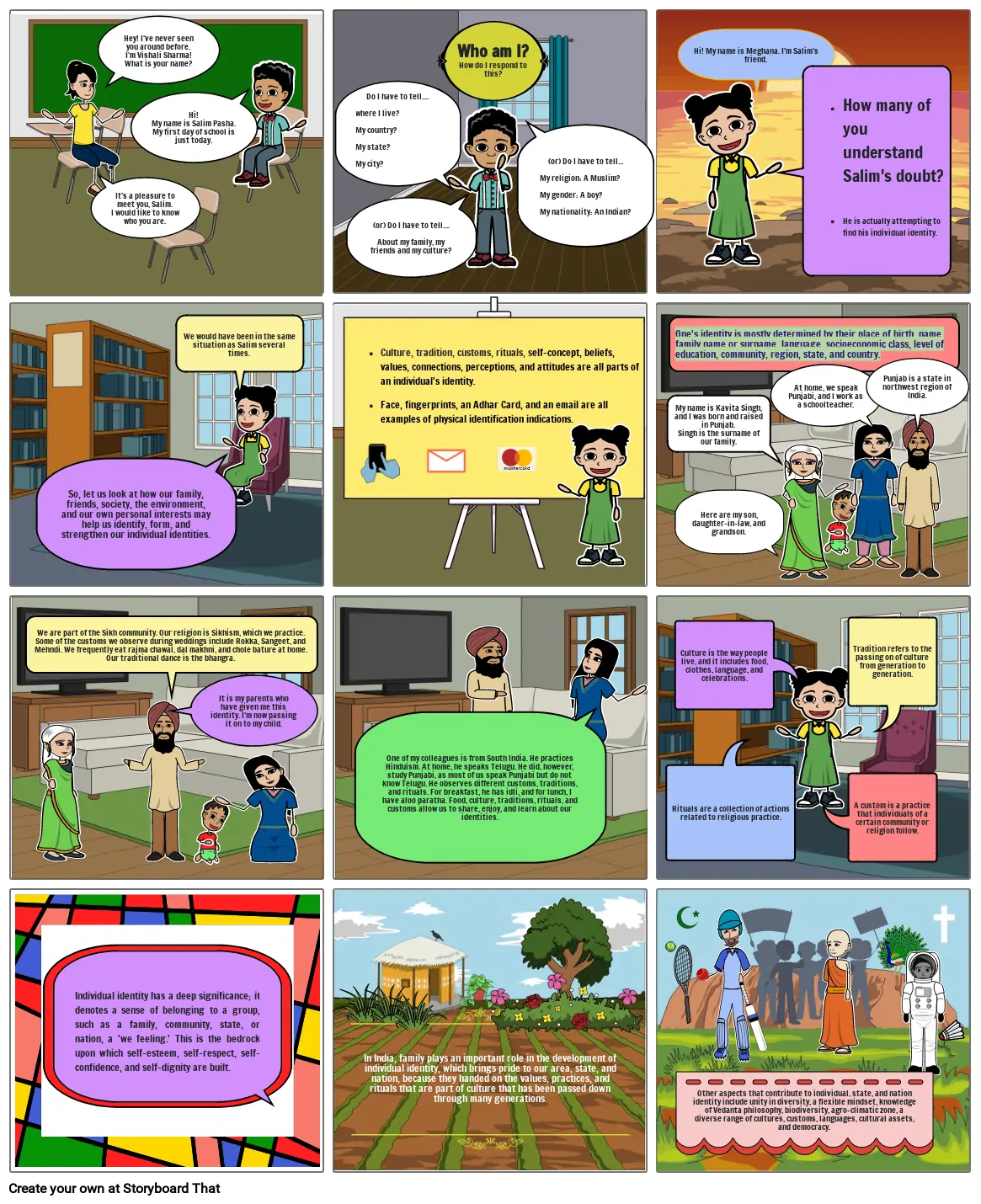Understanding Culture and Diversity

Storyboard Text
- It's a pleasure to meet you, Salim. I would like to know who you are.
- Hey! I've never seen you around before. I'm Vishali Sharma!What is your name?
- Hi!My name is Salim Pasha.My first day of school is just today.
- Do I have to tell.... where I live?My country?My state?My city?
- (or) Do I have to tell....About my family, my friends and my culture?
- Who am I?How do I respond to this?
- (or) Do I have to tell...My religion: A Muslim?My gender: A boy?My nationality: An Indian?
- Hi! My name is Meghana. I'm Salim's friend.
- How many of you understand Salim's doubt?He is actually attempting to find his individual identity.
- So, let us look at how our family, friends, society, the environment, and our own personal interests may help us identify, form, and strengthen our individual identities.
- We would have been in the same situation as Salim several times.
- Culture, tradition, customs, rituals, self-concept, beliefs, values, connections, perceptions, and attitudes are all parts of an individual's identity.Face, fingerprints, an Adhar Card, and an email are all examples of physical identification indications.
- My name is Kavita Singh, and I was born and raised in Punjab. Singh is the surname of our family.
- One's identity is mostly determined by their place of birth, name, family name or surname, language, socioeconomic class, level of education, community, region, state, and country.
- Here are my son, daughter-in-law, and grandson.
- At home, we speak Punjabi, and I work as a schoolteacher.
- Punjab is a state in northwest region of India.
- We are part of the Sikh community. Our religion is Sikhism, which we practice. Some of the customs we observe during weddings include Rokka, Sangeet, and Mehndi. We frequently eat rajma chawal, dal makhni, and chole bature at home. Our traditional dance is the bhangra.
- It is my parents who have given me this identity. I'm now passing it on to my child.
- One of my colleagues is from South India. He practices Hinduism. At home, he speaks Telugu. He did, however, study Punjabi, as most of us speak Punjabi but do not know Telugu. He observes different customs, traditions, and rituals. For breakfast, he has idli, and for lunch, I have aloo paratha. Food, culture, traditions, rituals, and customs allow us to share, enjoy, and learn about our identities.
- Rituals are a collection of actions related to religious practice.
- Culture is the way people live, and it includes food, clothes, language, and celebrations.
- A custom is a practice that individuals of a certain community or religion follow.
- Tradition refers to the passing on of culture from generation to generation.
- Individual identity has a deep significance; it denotes a sense of belonging to a group, such as a family, community, state, or nation, a 'we feeling.' This is the bedrock upon which self-esteem, self-respect, self-confidence, and self-dignity are built.
- In India, family plays an important role in the development of individual identity, which brings pride to our area, state, and nation, because they handed on the values, practices, and rituals that are part of culture that has been passed down through many generations.
- Other aspects that contribute to individual, state, and nation identity include unity in diversity, a flexible mindset, knowledge of Vedanta philosophy, biodiversity, agro-climatic zone, a diverse range of cultures, customs, languages, cultural assets, and democracy.
Over 30 Million Storyboards Created
No Downloads, No Credit Card, and No Login Needed to Try!
